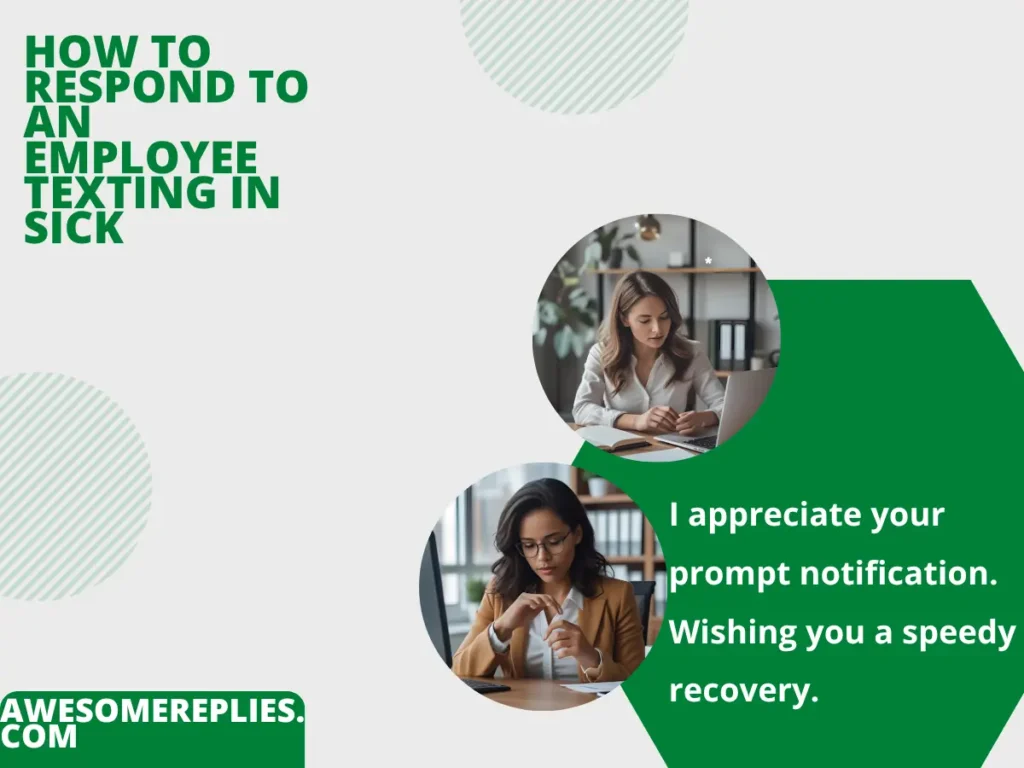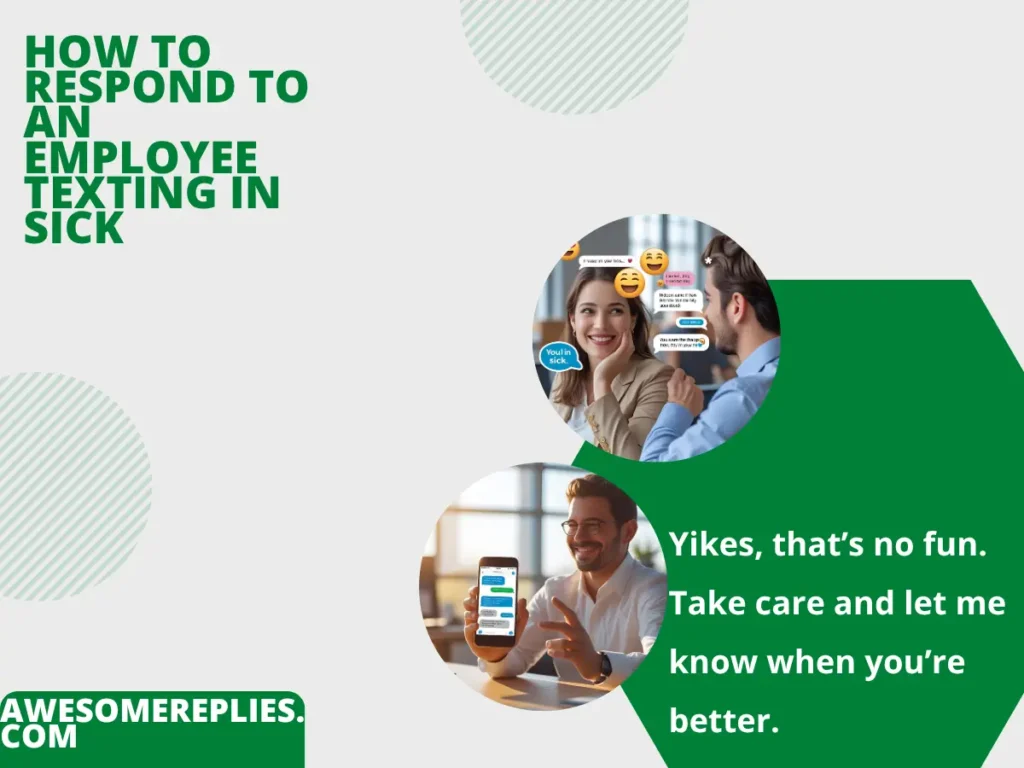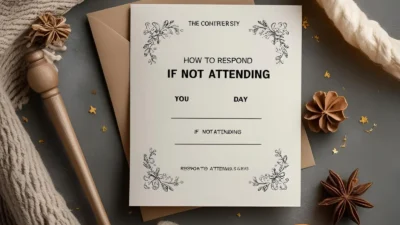Struggling to find the perfect way to respond to an employee texting in sick? You’ve landed in the right place.
This article delivers clear, professional, and empathetic ways to handle this common workplace situation.
Whether you’re a manager aiming for a formal tone, a colleague keeping it casual, or someone seeking a polished yet approachable response, we’ve got you covered.
Different situations call for varied approaches to show support, maintain professionalism, or keep the conversation light.
Read on for a comprehensive guide with over 120 ways to respond, tailored to every context.
Formal Ways to Respond to an Employee Texting in Sick

When an employee texts in sick, a formal response shows professionalism and care. These responses suit managers or HR professionals aiming to maintain a respectful tone while acknowledging the situation.
- Thank you for letting me know. Please take the time you need to recover fully.
- I appreciate your prompt notification. Wishing you a speedy recovery.
- Sorry to hear you’re unwell. Rest well and keep us updated on your condition.
- Thank you for informing me. Please prioritize your health and recovery.
- I’m sorry you’re feeling under the weather. Take care and let us know how you’re doing.
- Your health comes first. Thank you for updating me. Rest and recover soon.
- I understand you’re not feeling well. Please take care and let me know if you need anything.
- Thank you for the update. Wishing you a quick and full recovery.
- I’m sorry to hear you’re sick. Please focus on getting better and keep me posted.
- Appreciate you letting me know. Take all the time you need to feel better.
- Sorry to hear you’re unwell. Please rest and let us know how we can support you.
- Thank you for notifying me. I hope you recover quickly and completely.
- I’m sorry you’re feeling poorly. Take care of yourself and update me when you can.
- Your health is our priority. Thank you for letting me know. Get well soon.
- I appreciate your message. Please rest and recover, and keep me informed.
- Sorry to hear you’re not well. Wishing you a swift recovery.
- Thank you for the heads-up. Take care of yourself and let us know how you’re doing.
- I’m sorry you’re under the weather. Please focus on your health and keep in touch.
- Appreciate the update. Rest well and let me know if you need any assistance.
- Sorry to hear you’re sick. Please take the time to recover fully.
- Thank you for letting me know. I hope you feel better soon.
- I’m sorry you’re unwell. Please prioritize rest and recovery.
- Your health matters. Thank you for informing me. Get well quickly.
- Sorry to hear you’re not feeling well. Take care and let us know your progress.
- I appreciate your message. Please focus on getting better and update me soon.
- Thank you for the notification. Wishing you a speedy and full recovery.
- I’m sorry you’re feeling ill. Rest well and keep me posted.
- Appreciate you letting me know. Take care of yourself and recover soon.
- Sorry to hear you’re unwell. Please rest and let us know how we can help.
- Thank you for updating me. I hope you’re back to full health soon.
- I’m sorry you’re not well. Please take the time you need to recover.
Informal Ways to Respond to an Employee Texting in Sick

Sometimes, a casual response fits better, especially if you have a friendly rapport with the employee. These informal responses keep things light while showing concern.
- Oh no, feel better soon! Take it easy and let me know how you’re doing.
- Bummer you’re sick! Rest up and hope you’re back to normal soon.
- Sorry you’re feeling rough. Chill out and get well quick!
- Yikes, that’s no fun. Take care and let me know when you’re better.
- Ugh, being sick stinks. Rest up and shoot me a text later.
- Sorry you’re under the weather. Kick back and feel better soon!
- Oh man, get well quick! Take it easy and keep me posted.
- That’s a drag you’re sick. Rest up and let me know how it goes.
- Sorry you’re not feeling great. Take care and hope you’re back soon.
- Bummer you’re unwell. Relax and get better quick!
- Oh no, hope you feel better soon! Take it easy, okay?
- Sorry you’re sick. Rest up and let me know when you’re feeling better.
- That’s rough! Take care and hope you’re back in action soon.
- Ugh, being sick is the worst. Rest well and keep me in the loop.
- Sorry you’re feeling off. Take it easy and get well soon!
- Oh man, that’s no good. Rest up and let me know how you’re doing.
- Bummer you’re not well. Take care and hope you’re better quick.
- Sorry you’re under the weather. Chill and get back to feeling great!
- Yikes, being sick is no fun. Rest up and text me later.
- Oh no, feel better fast! Take it easy and keep me posted.
- Sorry you’re not feeling good. Relax and hope you’re better soon.
- That’s a bummer. Rest well and let me know when you’re back.
- Ugh, sorry you’re sick. Take care and get well quick!
- Hope you feel better soon! Rest up and keep me updated.
- Sorry you’re feeling rough. Take it easy and get better fast.
- Bummer you’re unwell. Chill out and hope you’re back soon.
- Oh no, that’s no fun. Rest up and let me know how you’re doing.
- Sorry you’re not well. Take care and feel better quick!
- Yikes, being sick stinks. Rest well and shoot me a text soon.
- Oh man, get well soon! Take it easy and keep me in the loop.
- Sorry you’re feeling off. Relax and hope you’re better soon.
Idiomatic Ways to Respond to an Employee Texting in Sick
Idiomatic expressions add flair and personality to your response while keeping it empathetic. These phrases use common sayings to convey care in a unique way.
- Sorry you’re under the weather. Get back on your feet soon!
- Oh no, you’re down for the count. Rest up and bounce back quick!
- Feeling out of sorts? Take it easy and get back in the saddle soon.
- Sorry you’re laid up. Hope you’re up and at ‘em in no time.
- Yikes, you’re under the weather. Kick that bug and come back strong!
- Sorry you’re down and out. Rest up and get back to your old self.
- Feeling off your game? Take care and be back in top form soon.
- Oh no, you’re in a bad way. Rest well and shake it off quick.
- Sorry you’re feeling rough around the edges. Get well and shine again!
- Down with a bug? Take it easy and be back on track soon.
- Sorry you’re out of commission. Rest up and get fighting fit again.
- Feeling under par? Take care and be back to your best soon.
- Oh no, you’re in the dumps health-wise. Rest and rebound quick!
- Sorry you’re off your rocker with illness. Get well and rock it soon.
- Caught a nasty bug? Rest up and kick it to the curb fast.
- Sorry you’re down in the dumps. Take care and bounce back soon.
- Feeling out of whack? Rest well and get back in the groove.
- Oh no, you’re under the weather. Shake it off and shine again soon.
- Sorry you’re not up to snuff. Take it easy and recover quick.
- Down with something? Rest up and be back in fine fettle soon.
- Sorry you’re feeling off-color. Take care and get your spark back.
- Oh no, you’re in rough shape. Rest well and come back strong.
- Sorry you’re not in tip-top shape. Get well and be your best soon.
- Feeling a bit off the boil? Take it easy and recover fast.
- Sorry you’re under the weather. Rest up and get back in the swing.
- Oh no, you’re out of sorts. Take care and be back on form soon.
- Sorry you’re down with a bug. Rest well and shake it off quick.
- Feeling below par? Take it easy and get back to your best.
- Sorry you’re not firing on all cylinders. Rest and recover soon.
- Oh no, you’re in a bad spot. Take care and bounce back fast.
- Sorry you’re feeling out of kilter. Rest up and get back on track.
Professional Ways to Respond to an Employee Texting in Sick
For workplace settings like emails or meetings, professional responses strike a balance between empathy and formality. These phrases work well in written or verbal communication.
- Thank you for informing me. Please focus on your recovery and keep me updated.
- I’m sorry to hear you’re unwell. Take the time you need to get better.
- Appreciate the update. Wishing you a quick recovery and return to work.
- Sorry you’re not feeling well. Please rest and let us know how you’re doing.
- Thank you for letting me know. Take care and hope you’re back soon.
- I’m sorry you’re under the weather. Prioritize your health and keep in touch.
- Appreciate your notification. Rest well and let me know your progress.
- Sorry to hear you’re sick. Please take care and update me when possible.
- Thank you for the heads-up. Wishing you a speedy and full recovery.
- I’m sorry you’re feeling poorly. Focus on getting better and keep me posted.
- Appreciate you letting me know. Take the time you need to recover.
- Sorry you’re unwell. Please rest and let us know how we can assist.
- Thank you for updating me. I hope you feel better soon.
- I’m sorry you’re not well. Take care and keep me informed.
- Appreciate the message. Rest up and wishing you a quick recovery.
- Sorry to hear you’re feeling off. Please prioritize your health and update me.
- Thank you for notifying me. Take care and hope you’re back soon.
- I’m sorry you’re under the weather. Rest well and keep in touch.
- Appreciate your update. Please focus on recovery and let me know how you’re doing.
- Sorry you’re not feeling great. Take the time you need to get better.
- Thank you for letting me know. Wishing you a swift recovery.
- I’m sorry you’re unwell. Please rest and update me on your condition.
- Appreciate the notification. Take care and hope you’re feeling better soon.
- Sorry to hear you’re sick. Focus on your health and keep me posted.
- Thank you for the update. Rest well and let us know how we can support you.
- I’m sorry you’re not well. Take it easy and update me when you can.
- Appreciate you letting me know. Wishing you a quick and full recovery.
- Sorry you’re feeling under the weather. Please rest and keep in touch.
- Thank you for informing me. Take care and hope you’re back to health soon.
- I’m sorry you’re unwell. Prioritize recovery and let me know your progress.
- Appreciate the heads-up. Rest up and wishing you a speedy recovery.
Conclusion
Responding to an employee texting in sick requires the right tone for the situation.
Whether you choose a formal, informal, idiomatic, or professional phrase, your response should show empathy, encourage recovery, and maintain clear communication.
Using the appropriate phrase builds trust, supports your employee, and keeps the workplace running smoothly.
Practice these responses to ensure you’re ready for any scenario.
Pick a few favorites from each category and tailor them to your workplace culture for the best impact.




